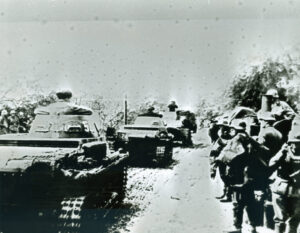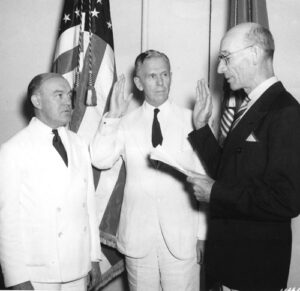
German light tanks advancing in an unknown area of Poland.
This article originally appeared on September 1, 2017.
September 1 marks the anniversary of the German invasion of Poland, the act responsible for starting World War II. That same day in 1939, George C. Marshall became the chief of staff of the United States Army; a position he would hold for the duration of the war and which earned him the accolade “Organizer of Victory” from Prime Minister Winston Churchill.
The news of the events in Poland reached Marshall early in the morning. At 3:50 am Marshall called Lieutenant Colonel Orlando Ward, secretary of the War Department General Staff, to request that Ward inform the Overseas Department and the Corps Areas’ headquarters about the invasion. In the office of Secretary of War Harry Woodring at 10:30 AM George C. Marshall was sworn in by the adjutant general of the army Major General Emory S. Adams.
 Despite the fact that the ceremony elevated Marshall to the highest ranking officer in the army, he dressed in a civilian suit for the occasion. Conscious that any military display could be interpreted as showing favor for US intervention in Europe, Marshall sought to avoid upsetting the American public whose support would be essential to achieving his goal of increasing the state of readiness of the army.
Despite the fact that the ceremony elevated Marshall to the highest ranking officer in the army, he dressed in a civilian suit for the occasion. Conscious that any military display could be interpreted as showing favor for US intervention in Europe, Marshall sought to avoid upsetting the American public whose support would be essential to achieving his goal of increasing the state of readiness of the army.
At the time Marshall became chief of staff, the United States Army total manpower was 174,000, making it the nineteenth largest army in the world. Faced with the daunting task of readying the ill-equipped, under-funded, and minimally trained army for war, Marshall must have felt a sense of déjà vu. During World War I, Marshall witnessed first-hand the delay of the U.S. Army’s participation in the conflict due to the amount of time required for mobilization. Marshall also recognized the serious, and possibly fatal, consequences of sending poorly equipped and untrained soldiers into combat. Later, as secretary of defense in the early stages of the Korean War, Marshall must have been incredulous when the army consisted of a few understrength divisions.
In the midst of the arduous task of improving army preparedness Marshall wrote to Captain William T. Sexton in a memorandum dated July 22, 1940, that “For almost twenty years we had all of the time and almost none of the money; today we have all of the money and no time.” Although Marshall’s repeated calls for military preparedness were largely ignored by politicians and the American public, he worked hard to make the most of the situation he faced. Under Marshall’s leadership as chief of staff, the United States Army was transformed into a fighting force of nearly 8.5 million men and women that helped bring hostilities in Europe to an end more than 5 years after the conflict began.
